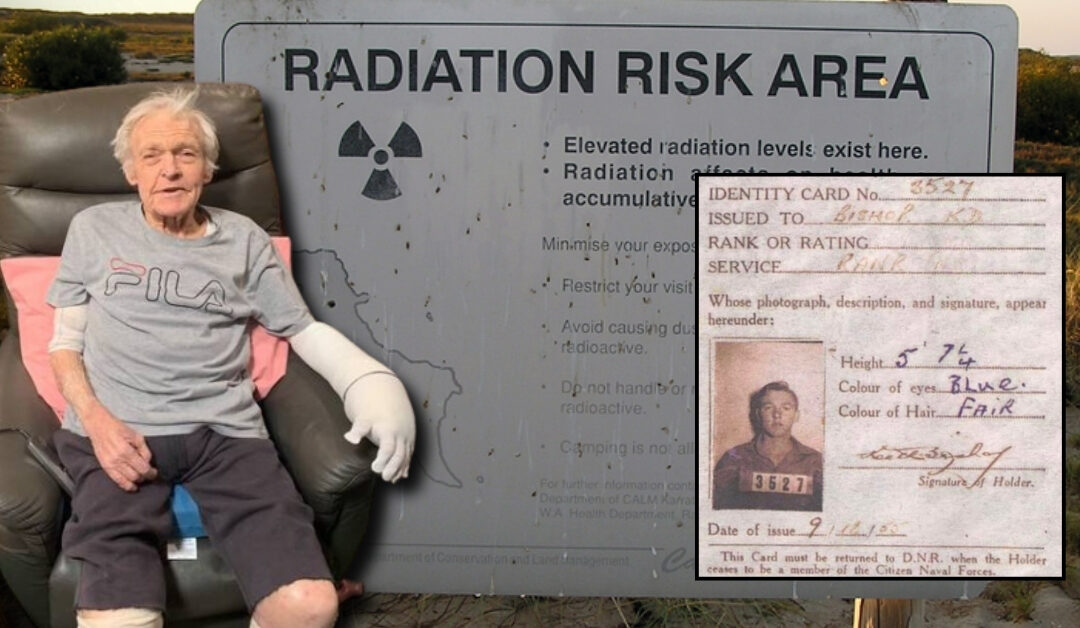Nasho Keith Bishop never thought he’d live to see the day. Yet there he was, 88-years-old, breaking down in tears as his wife read him the news that he’d been granted the Gold Veterans’ Card in July this year.
“I cried… I cried because we tried so long, and my wife, who’s a busy person, has worked as hard as anybody to help me,” he said.
“That’s the first positive finding from anywhere that they [the government] has recognised me as being affected.”
It’s been a long, soul-destroying road to this point, full of costly operations and the trauma of being unable to move or live like he once could because of what happened while he was conscripted as an 18-year-old.
Among the many setbacks, Keith has struggled to get veteran entitlements for his service-related injuries, which shattered his hope of seeing any reparation and recognition.
But that all changed in July with the Gold Card, which instilled a sense of self-worth and inner peace he hasn’t felt in years.
“It was a tremendous relief; you have no idea,” he said.
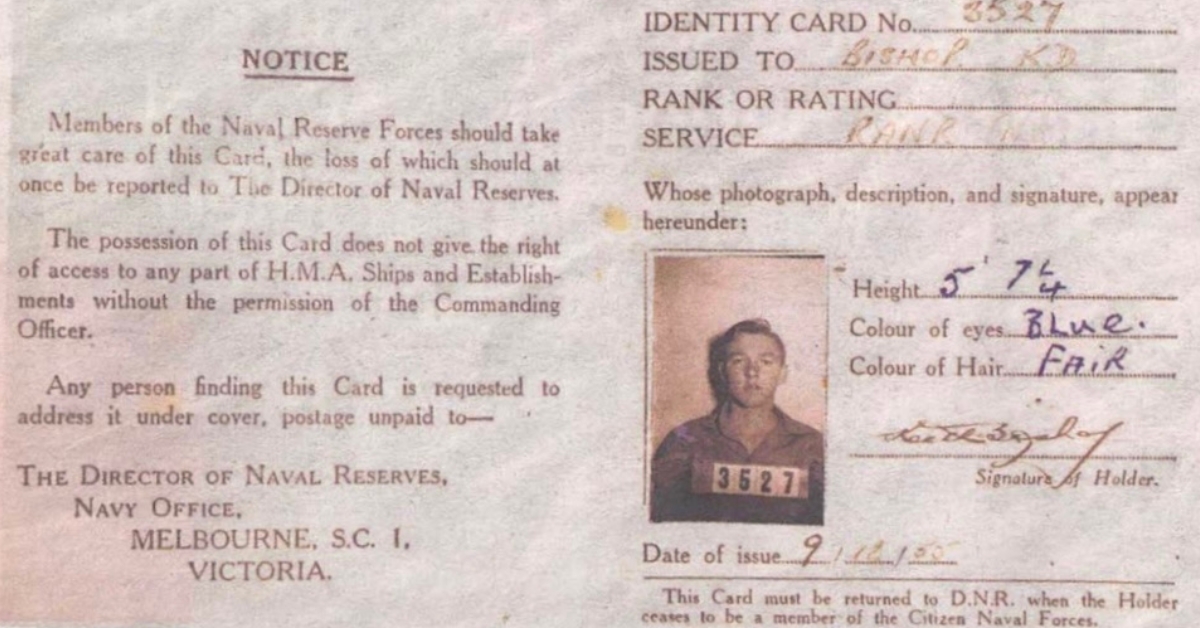
Pictured above: Keith’s ID card from the navy, issued 1955.
Keith’s body is failing him. Once an avid runner and proud Rotarian, he spends much of the day in a chair and struggles to move unassisted because of excruciating cancerous lesions covering his body, except for his torso.
Medical reports to the Department of Veterans’ Affairs from August this year state his cancer resulted from nuclear radiation exposure while he was conscripted at the Montebello Islands, off the West Australian coast, in May 1956.
The British Government was running a nuclear testing program on the islands, which was approved in a secret deal struck with the Australian Government.
Twelve test detonations were conducted.
On 16 May 1956, Keith was in the vicinity of a 15 kiloton explosion while on board the HMAS Fremantle, docked near the G1 test site on Trimouille Island.
The yield of the explosion measured the same as, if not marginally larger than (as some reports indicate), the Hiroshima bomb during the Second World War.
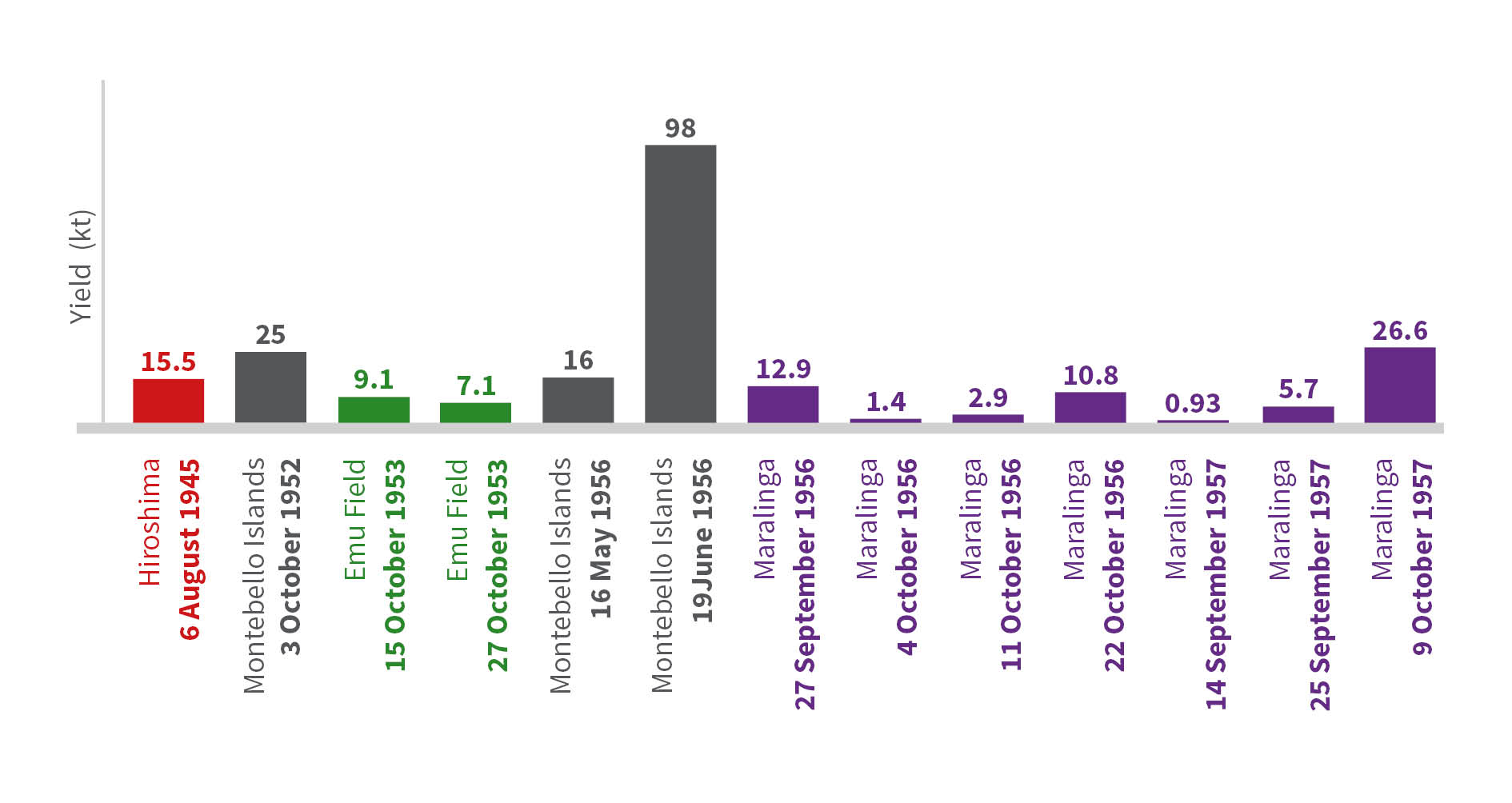
Pictured above: Graph showing the yields and locations of atomic detonations in Australia. Keith was affected by the explosion of 16 May 1956. Credit | Australian Radiation Protection and Nuclear Safety Agency
“His vessel was anchored just 7 miles [approximately 11km] from ground zero, and he was on the quarterdeck during the detonation of the atomic test,” the doctor wrote in Keith’s Gold Card application.
Radioactivity was detected on the mainland from Onslow to Broome, WA, the next day, according to the 1985 Royal Commission into the British Nuclear Tests.
Even today, visits to the island are restricted to one hour because of the exposure risk.
Post detonation, Keith was forced to swim approximately 200m through radioactive waters to the island.
“Later he and 11 other National Servicemen were ordered to swim to the island where ground zero was and return to the vessel,” the doctor’s report found.
“All of their clothes were taken from them and burned whilst they were washed down with sea water to remove any possible contamination.”
Pictured above: Keith was forced to swim in radioactive waters to Trimouille Island, one of more than 100 islands forming the Montebellos.
Keith said they had no idea what they were in for.
“We knew it was scary, but we had no idea what scary meant then,” he said.
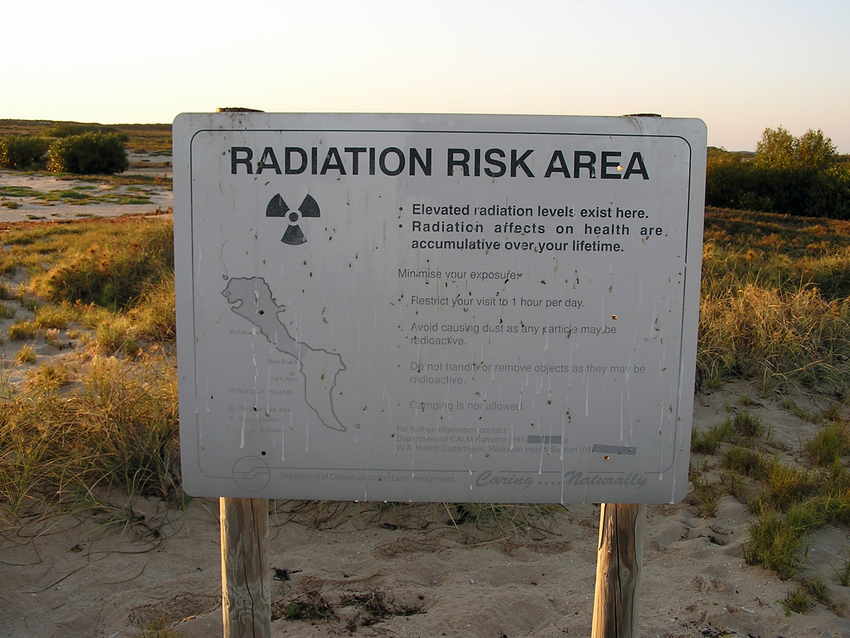
Pictured above: A nuclear radiation sign on Trimouille Island, photographed by Brian Gordon Bush, 2007
TOTAL LOSS OF INDEPENDENCE
Keith was diagnosed around 15 years ago in his late 70s. Ever since, it’s been a slow, painful descent toward physical incapacity.
In a testimony to the DVA, Keith wrote:
“Over the past 15 years, I have totally lost my independence. I have nurses visit five times a week to tend to all my wounds and change dressings.
I am unable to leave my home without assistance and I am even unable to provide a basic meal for myself.
Financially, I am dependent on my wife, who is still working and funding all my care which is totally humiliating for someone such as myself who has prided themselves on being so strong and independent.
Since the mid 80s I have had numerous operations and treatments which have drained all my cash resources.”
His wife of 30 years, Jan, has been by his side the whole time.
“Keith is left with four fingers on one hand,” she said.
“The other hand – he has a huge growth on, and if he removes that, he won’t have any hands to manoeuvre. Now, just about the torso is the only part that doesn’t have any cancer.
“He’s got both legs covered. He’s in constant pain. He’s had X number of surgeries. He’s in pain from getting up in the morning to getting up at night.”
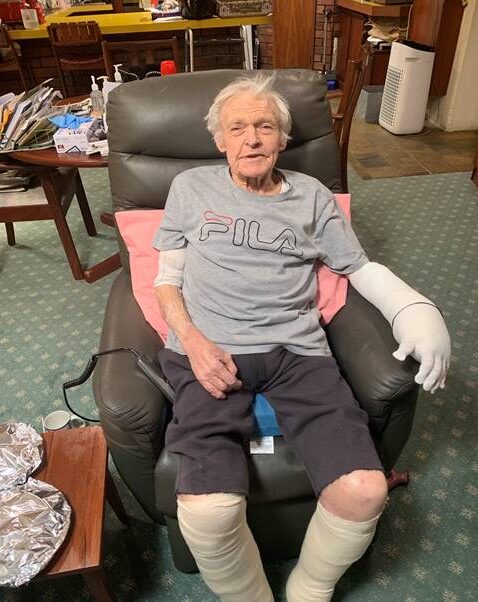
Pictured above: Keith sitting in his living room with a compression sock on his cancer-riddled left hand.
Jan said the ordeal has seriously strained their lives.
“It’s affected us as a couple because I’m working my butt off to keep a roof over our heads, and he can’t work and hasn’t been able to for approximately 15 years,” she said.
“I’m working 7 days a week, virtually.”
Jan’s counted losses of more than $100,000 from Keith’s medical bills.
“Honest to god it goes on and on – it’d be hundreds of thousands,” she said.
“The Gold Card has certainly helped from the point of view that we’ve got a very good, efficient group who come to do his dressings and shower him every day, but there’s other times that there’s no one – and I do that as well.
“To me, it doesn’t even cut the cake for how much I’ve spent on operations and for all the things that Keith needs.
“Keith doesn’t like it because he had ideas that he was going to be the one to support us throughout, and he feels terrible about that as well.”
However, most of the damage is already done. The money is irrecoverable.
Keith can only claim expenses for treatment provided after June 18 this year. The DVA will not compensate for any financial losses accrued before that date.
Jan said it feels like a slap in the face.
“Well, I was so disappointed [by that], and not only disappointed, but I just couldn’t believe that these people who supposedly are looking after the Nashos, and making all these promises, cannot meet the need of the people who went into these forces without consent or information or any particular understanding of what it meant if they got injured,” she said.
The other issue is Keith’s age. At 88-years-old, he’s acutely aware he might not live long enough to benefit from the entitlement.
“Of course I’m very much annoyed,” he said.
“I’m one of those lucky people who’ve gotten this far, and have still got a little bit of go in me, but not much.
“The go is virtually getting out of bed and being with the dogs, and I say goodbye to my wife in the morning; she gets home at night.
“And that’s the way it’s been for 15 years — it’s not a life.”
REJECTION LEFT BISHOPS CONFUSED AND UPSET
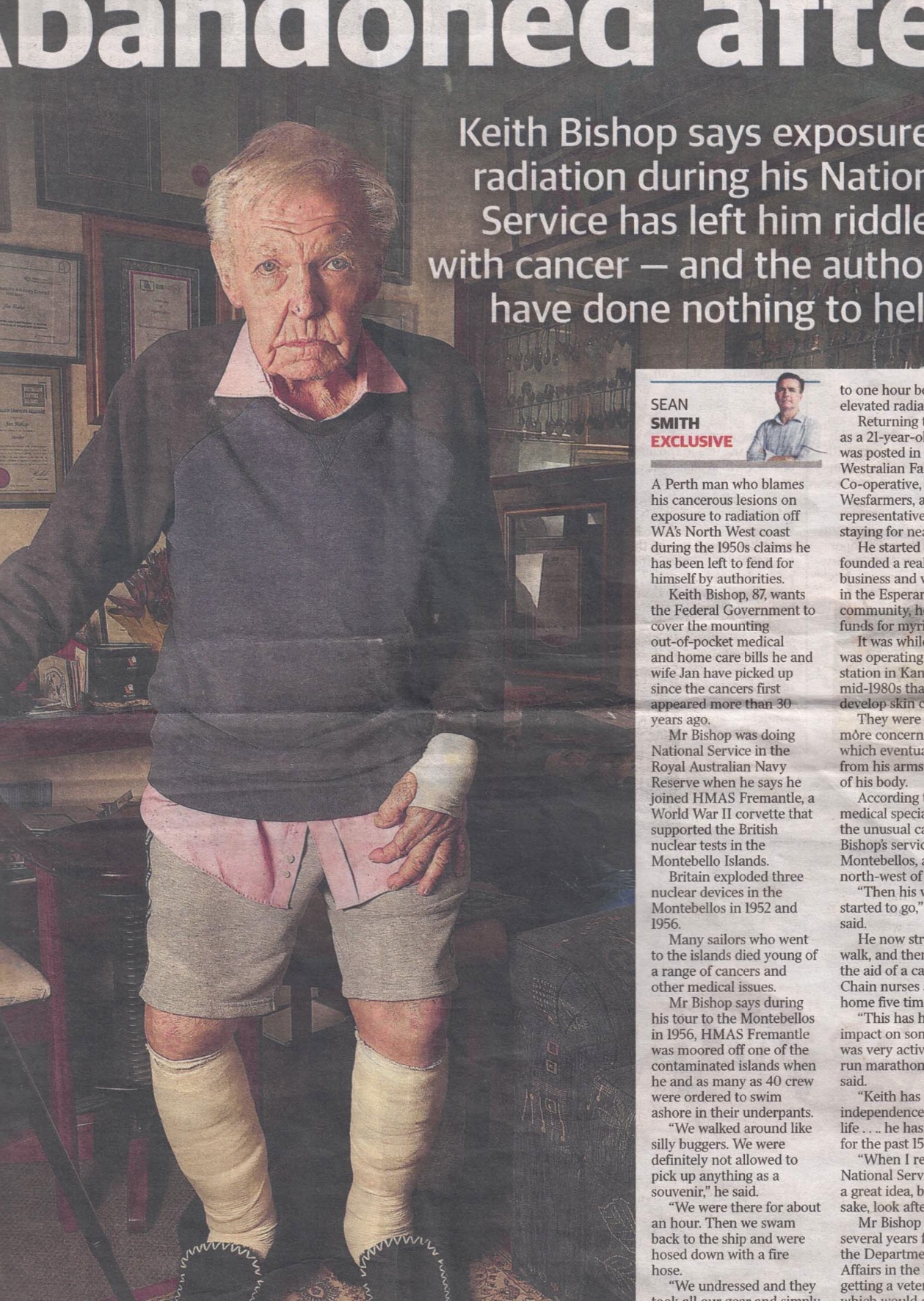
Pictured above: Jan took Keith’s story to The West Australian newspaper. The article, published in June 2024, was released before Keith’s Gold Card was approved, and before doctors established an official correlation between Keith’s service and cancer diagnosis.
Keith ponders what life could have been like if he was accepted for the Gold Card earlier.
In 2017 the Australian Government made eligible for the Gold Card all participants of the British Nuclear Testing program between 1952 and 1957.
But Keith was denied the entitlement when he first applied in May 2020 because of an unfortunate mistake in his application.
At the time, he didn’t know why because of his age and lack of familiarity with the DVA system.
The DVA would not comment on Keith’s case for confidentiality reasons. Even with Keith and Jan’s permission, the department declined.
A federal government source later told this publication that Keith was rejected because he applied using the incorrect form.
Rather than using the application for participants of the British Nuclear Test program, he applied using the Gold Card form for qualifying service, which is intended for veterans with war-like service.
The government source said the DVA was unable to transfer his application to the correct administrative pathway.
The Bishops said none of this was communicated to them. All Keith received from the DVA was a letter telling him that he didn’t meet the definition of a veteran under the criteria for qualifying service.
The letter stated: “On 12 May 2020 a delegate of the Repatriation Commission decided you are not an Australian veteran as defined in section 5C (1) of the Veterans’ Entitlements Act 1986.”
Confused and upset by the outcome, Keith and Jan nearly gave up on the prospect.
RED TAPE HURTING VETERANS
Nasho Fair Go President Geoff Parkes slammed the handling of Keith’s claim as bureaucratic madness.
“Bloody angry, mate, bloody angry, I can tell you,” he said.
“That’s the whole way the system works.
“Everything that happens the DVA does is when they are forced to do things, but they won’t go out and make things happen. Now, with Keith’s situation, someone should have just come out and put him through the right channels.”
Keith isn’t the only one having these difficulties.
“We’ve got members who put in a claim under one of the acts, got knocked back because they should have put the claim through another act – and they didn’t even know it,” Mr Parkes said.
He said this has to stop, and that veterans – particularly elderly ones – should have greater opportunity to rectify mistakes during an application processes given their lack of computer skills and knowledge of the system.
“Our members are not computer literate by and large, but even if they are, we left the service all those years ago; we’ve had nothing to do with the service,” he said.
“We had no reason to look at DVA websites and find out all these things we were entitled to. It’s just very frustrating.”
When Keith was first denied the Gold Card in 2020, he didn’t see any point lodging a new application, thinking he would get the same result.
In June this year, he reapplied out of desperation.
Jan also contacted Nasho Fair Go, pleading for assistance.
This was part of her email to the organisation in July:
“Keith is now reapplying as the medical expense is catastrophic. He has been refused any assistance. He would certainly like to join your group as most of his comrades have died. Please assist him if possible. Jan Bishop”
NFG acted swiftly, taking Keith’s case to the highest levels of the DVA and connecting him with senior officials to expedite his claim.
Jan said this was a decisive moment.
“Keith wanted his story told, and I had organised the Sunday Times here in Perth for Keith to tell his story, but the pushover was definitely due to Nashos led by Geoff Parkes,” she said.
“Without that it was very difficult. I had to rely on other people who were Nashos to help us, and god bless them all for all their help: their comradeship which gave Keith hope, Keith feeling that people out there understood what he was going through. They’re the people who now need to be recognised by the government.”
Although Keith falls out of NFG’s target audience – Nashos who served between 1964 and 1972 – their President Geoff Parkes said it was critical they assisted.
“These guys we’re talking about – the 1951 to 59 Nashos – are not part of our cohort that we’re looking after,” Mr Parkes said.
“But you have to feel some sympathy for them because their average age is, well, they’ve passed away, and there’s no one left really to battle for them, and I figured it’s down to us to do what we could.
“But we’d support anybody in that situation; you’d be a very poor man not to.”
These days, Keith is a lot happier knowing he’s been recognised for his service and injuries, and that Jan has less of a financial burden.
He said he would have been lost without her.
“I reckon she’s added one third to my life, and now I feel a bit guilty that I’ve got nothing left to give, which I should have,” he said.
♦ Jan is currently applying for compensation for Keith’s medical expenses before the back payment date of June 18, as stipulated on his Gold Card.

